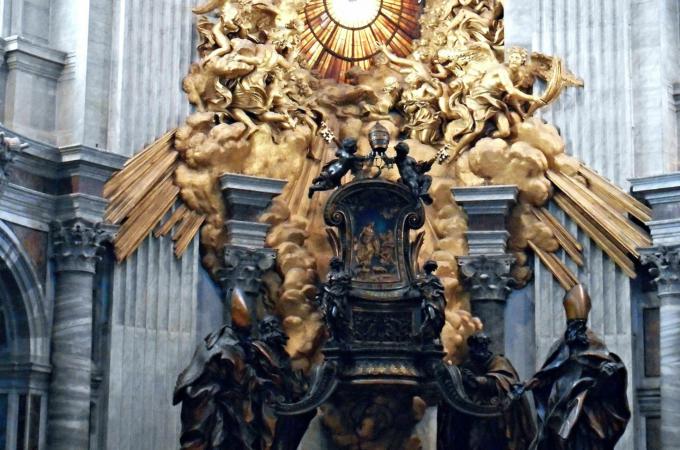Why in the world do Catholics celebrate a chair?
Today (2/22) the Church celebrates a curiously named feast called "the Chair of Saint Peter."
The "chair" references an actual piece of furniture that is encased in a monumental sculpture by Bernini located in the apse of St. Peter's Basilica. The sculpture depicts an enormous throne held aloft by four great saints of the Church- Saint Ambrose, Augustine, Athanasius and John Chysostom. The throne is actually a reliquary that holds a wooden chair that is reputed to have been used by the Apostle Peter himself and is therefore invested with significance as a symbol of the apostle's authority.
The wooden chair seems to have been repaired and reconstructed several times and therefore its actual provenance or origin remains unclear. Some assert that it can date no earlier than the medieval period while others insist that some parts of the chair are likely from a period earlier than the Middle Ages.
However, the "Chair" of St. Peter is not merely a piece of furniture; it is a statement of faith that Christ gave an authority to Saint Peter in regards to the Church that endures to this day in the mission and ministry of the pope as Bishop of Rome.
The mission and ministry of the pope is not simply to rule as an earthly sovereign over the Vatican or to be some kind of chairman of the board of the global Catholic Church. His authority is not just that of an executive who can dispense with this or that rule or practice at will or whim.
The mission, ministry, authority and power of the pope as successor of St. Peter is simply that he knows who Christ is - the pope knows who the Lord is in spirit and in truth - "The Christ, the Son of the Living God!"
It is this knowledge of Christ that is the foundation of his office, and in a symbolic sense, it is the pope's relationship with the Lord that is the "chair" from which St. Peter and his successors guide and govern the Church.
We live in an age in which people will deny the pope his mission, ministry and authority, and then claim that role as their own prerogative. Fearing the implications of the office of Peter, many, oddly enough, try to assuage that fear by reserving the authority of Saint Peter as teacher of the faith and custodian of the "keys to the kingdom" to their own private judgment. The end result of this reactionary disposition is that the Church fragments and dissipates and finally, disappears. (Instead of one Alexander Borgia, we get a million of them!)
Many men have been seated in the "chair" of Saint Peter over the centuries. Some were saints, others scoundrels, and many more barely left any impression on the Church at all.
In the end, what is important about the papacy is not the individuals who have served as successors of St. Peter, great or infamous as they might be, but the enduring testimony to the Lord Jesus that the mission and ministry of the popes represent: "And so I say to you, you are Peter, and upon this rock I will build my Church, and the gates of the netherworld shall not prevail against it."



















